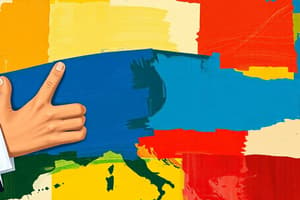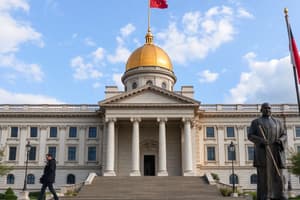Podcast
Questions and Answers
Match the following definitions with their corresponding terms related to political systems.
Match the following definitions with their corresponding terms related to political systems.
The ability to influence or control others' actions or outcomes. = Power A system where citizens have the right to participate in decision-making, often through elections. = Democracy The prevailing attitudes, beliefs, and values concerning politics and governance held by a country's citizens. = Political Culture The justified right to exercise power. = Authority
Match the following examples with their respective types of political systems.
Match the following examples with their respective types of political systems.
A system where power is concentrated in a single person or group, without significant participation from the general population. = Authoritarianism A system where citizens vote on policies directly. = Direct Democracy A system of government in which supreme power is held by a monarch, typically a king or queen. = Monarchy A highly restrictive form of authoritarianism where the state controls virtually every aspect of citizens' lives. = Totalitarianism
Match the following concepts with their definitions related to the study of polity.
Match the following concepts with their definitions related to the study of polity.
The right and acceptance of a government's power and authority by its citizens. = Legitimacy The supreme authority and power of a state to govern itself without external interference. = Sovereignty Formalized structures like legislatures, executive branches, judiciaries, and bureaucracies that shape the operation of the polity. = Institutions Ways citizens engage in political processes, such as voting, protesting, campaigning, holding office, and petitioning. = Political Participation
Match the following statements with their corresponding key concepts related to polity analysis.
Match the following statements with their corresponding key concepts related to polity analysis.
Match the following descriptions with their corresponding types of political systems.
Match the following descriptions with their corresponding types of political systems.
Match the following descriptions with their corresponding key concepts related to polity analysis.
Match the following descriptions with their corresponding key concepts related to polity analysis.
Match the following factors shaping a polity with their corresponding descriptions:
Match the following factors shaping a polity with their corresponding descriptions:
Match the following key issues and debates in political science with their descriptions:
Match the following key issues and debates in political science with their descriptions:
Match the political system with its definition:
Match the political system with its definition:
Match the following political concepts with their definitions:
Match the following political concepts with their definitions:
Match the following terms related to international relations with their definitions:
Match the following terms related to international relations with their definitions:
Flashcards
Polity
Polity
The form or system of government in a state or country, encompassing structures and processes.
Sovereignty
Sovereignty
The supreme authority of a state to govern itself without outside interference.
Legitimacy
Legitimacy
The acceptance of a government's power by its citizens, derived from tradition or support.
Power
Power
Signup and view all the flashcards
Authority
Authority
Signup and view all the flashcards
Institutions
Institutions
Signup and view all the flashcards
Political culture
Political culture
Signup and view all the flashcards
Democracy
Democracy
Signup and view all the flashcards
Oligarchy
Oligarchy
Signup and view all the flashcards
Political instability
Political instability
Signup and view all the flashcards
Corruption
Corruption
Signup and view all the flashcards
Inequality
Inequality
Signup and view all the flashcards
Globalization
Globalization
Signup and view all the flashcards
Study Notes
Definitions and Scope
- Polity refers to the form or system of government in a particular state or country.
- It encompasses the structures, processes, and principles by which power is acquired, exercised, and legitimized within a political system.
- This includes aspects such as the distribution of power among different institutions, the relationship between the government and citizens, and the rules governing political participation.
- Polity analysis aims to understand the nature of political systems, their behaviors, and outcomes.
Key Concepts
- Sovereignty: The supreme authority and power of a state to govern itself without external interference. A core concept in understanding a polity's independence and legitimacy.
- Legitimacy: The right and acceptance of a government's power and authority by its citizens. This can derive from traditions, historical events, or popular support.
- Power: The ability to influence or control others' actions or outcomes. In a polity, power is distributed among institutions and individuals.
- Authority: The justified right to exercise power. Differentiated from mere power, authority relies on norms, rules, and societal acceptance.
- Institutions: Formalized structures like legislatures, executive branches, judiciaries, and bureaucracies that shape the operation of the polity.
- Political culture: The prevailing attitudes, beliefs, and values concerning politics and governance held by a country's citizens.
- Political participation: Ways citizens engage in political processes, such as voting, protesting, campaigning, holding office, and petitioning. High participation often indicates a healthy polity.
Types of Political Systems
- Democracy: A system where citizens have the right to participate in decision-making, often through elections. Further categorization includes direct democracy (citizens vote on policies directly) and representative democracy (citizens elect representatives to make decisions).
- Authoritarianism: A system where power is concentrated in a single person or group, without significant participation from the general population. This includes dictatorships and one-party states.
- Totalitarianism: A highly restrictive form of authoritarianism where the state controls virtually every aspect of citizens' lives.
- Monarchy: A system of government in which supreme power is held by a monarch, typically a king or queen.
- Oligarchy: A system where a small group of people holds power, often based on economic or military strength, rather than widespread participation.
Factors Shaping Polity
- Historical context: Past events and traditions significantly influence the development and structure of any polity.
- Economic conditions: A country's economic prosperity or hardship can affect political stability and the types of policies pursued.
- Social factors: Demographic characteristics, cultural norms, and social movements shape political preferences and behaviors.
- Geographic conditions: Factors such as location and natural resources can influence a polity's foreign relations and internal development policies.
- International relations: Interactions with other countries impact a polity's security, alliances, and trade patterns.
Key Issues and Debates
- Political instability: Conditions marked by frequent shifts in power, social unrest, and difficulty maintaining order.
- Corruption: Abuse of public office for personal gain, often undermining trust in government.
- Inequality: Uneven distribution of resources and opportunities within a society, capable of fueling social unrest and challenging polity legitimacy.
- Globalization: The interconnectedness of global economies and societies can present challenges and opportunities for polties in adapting to changing circumstances.
- Relationship between state and civil society: The balance of power between official governmental institutions and private organizations and citizens' groups is crucial to a healthy and functional polity.
Studying That Suits You
Use AI to generate personalized quizzes and flashcards to suit your learning preferences.




